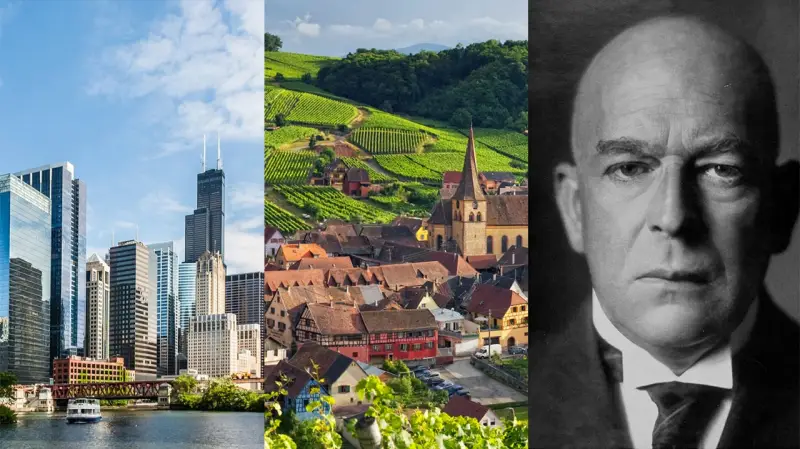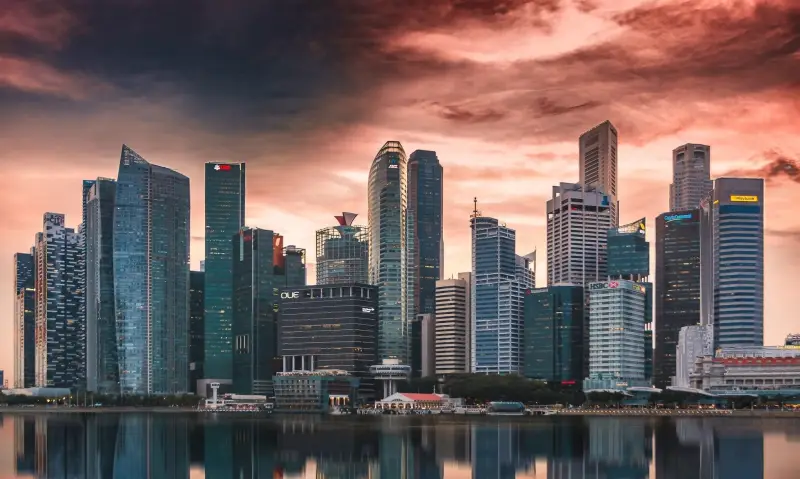The image of the “world city” and province in Oswald Spengler’s philosophical work “The Decline of the Western World”

The topic of confrontation between city and countryside has been raised by many philosophers at different times. For the first time, the opposition between urban (polis) and rural (natural, natural) life is found in Plato’s “Republic”. Often in such works, urban civilization, with the dominant mythology of the human mind, is contrasted with the natural beginning of rural life, the idea of harmony with nature.
The emergence and development of cities is an essential sign of civilization. Cities appeared as a result of the deepening of the social division of labor, during the period of separation of crafts from agriculture, the emergence of regular commodity exchange, and private property. The main criterion for the development of a city is its position in social space, its role in relationships with other cities and rural areas. The following stages of development of the relationship between the city and the province can be distinguished: city and province, capital and province, world city and province [2].
The German philosopher Oswald Spengler made a new turn in world urbanism, proposing to consider the city as historical and cultural phenomenon. If for a person of an early chthonic culture the most important form of his existence was the house, then for a historical person of a developed and complex culture the city becomes such. According to the philosopher, in the early stages of human culture, cities arise spontaneously, like a plant, rooted in the soil. As humanity grows up, a gigantic city emerges - the world capital, a city “like the world”, which itself determines the course and meaning of history [3].
The capital is not just the main city, center, seat of power, it is also the engine and the highest manifestation of local civilization. The degree of civilization of a nation is judged, among other things, by its capital, which contains the most significant values of the national culture. With the advent of the capital, city life was divided into metropolitan and provincial, which were significantly different from each other.
Spengler noted that the emergence of civilization is inevitably accompanied by the emergence of such phenomena as the “world city” and “province”. However, his attitude towards the “world city” was negative. The philosopher noted that a world city is a point at which the life of vast countries is concentrated, while at the same time everything else withers, withers and is devastated. Spengler’s ideas about the “world city” and the province will be considered in this material.
“A world city means cosmopolitanism”

Oswald Spengler believed that civilization is the inevitable fate of any culture and its completion. One of the main signs of civilization is over-urbanization, that is, the emergence of large (“world”) cities opposing the provinces.
According to the German thinker, the city and the village differ from each other not in size, but in the presence of soul. Not all large settlements claiming to be cities actually are - the "world cities" or world capitals that have emerged are gigantic cities of very limited numbers that despise the mother landscape of their culture, relegating it to the concept of a "province". Everything is now a province - a village, a small town, and a big city, with the exception of two or three points.
In The Decline of the Western World, Spengler notes that the city is a spirit. A big city is a “free spirit”. The bourgeoisie begins to realize its isolated existence with a protest against “feudalism,” that is, the dominance of blood and tradition. It overthrows thrones and restricts old rights in the name of the “people,” which now means exclusively the people of the cities.
Democracy is a political form in which the peasant is required to have the worldview of a city dweller. The city, thus, takes upon itself the leadership of economic history, putting in the place of land, a primary value that cannot in any way be separated from peasant life and thinking, the concept of money abstracted from goods [4].
An era begins when the city has developed so much that it no longer needs to assert itself in relation to the village, in relation to the peasantry and knighthood, and now the village with its ancestral classes is waging a hopeless defense against the sole domination of the city. At this time, cities that can be considered leading in history become very few. First of all, a deep spiritual difference arises between a large and a small city [4].
Then, Spengler notes, a world capital arises, a center in which the course of world history is concentrated. World capitals are gigantic cities of all mature civilizations, very limited in number. The German philosopher has a negative attitude towards “world cities”.
In his opinion, the urbanization of megacities leads to the fact that the “world city,” as Spengler says, concentrates the life of an entire country. Spiritual, political, and economic decisions are made not by the whole country, but by several “world cities” that absorb the best human material of the country, and it descends to the position of a province.
The man of the “world city” is thus freed from the power of tradition, for the population of such cities overwhelmingly consists of a formless mass. His sense of the need to procreate also fades away.
As a result, highly developed civilizations are entering a stage of monstrous depopulation, stretching over several centuries.
Megacity as a global financial center
Megacities (“world cities”) differ from capitals (although in most cases they themselves are also capitals) primarily in that if the capital is a manifestation of local civilization, national culture, then the metropolis is a manifestation of “world civilization” and cosmopolitan culture. The emergence of megacities occurs in different ways: some were formed on the basis of capitals (Paris, London, Tokyo, Moscow), others arise in the most developed areas of the country [2].
All megacities are united by the fact that they are also centers of world trade and the movement of global financial capital. In essence, it is a global financial center. Oswald Spengler also drew attention to this.
He noted that it is the “world capital” that produces the world economy - a civilized one, emanating from a very limited circle of centers and subordinating everything else as a provincial economy. With the growth of cities, their life support becomes more and more sophisticated, sophisticated, and intricate [4].
— writes Spengler.
Money, elevated to the rank of the main value and meaning of life in an urban environment, neutralizes all other values, including those that determine the quality of a natural person.
The egoistic aspirations of the metropolis turn it into a powerful centrifugal force (the desire to become a “state within a state”) and at the same time a centripetal force (to transform its social body into a gigantic organism by absorbing the world space, which is poorly developed financially and informationally). Therefore, megacities begin to grow uncontrollably [2].
Conclusion
The emergence of a “world city” for Oswald Spengler was a sign of the aging and death of culture. He saw in giant cities (metropolises) a symptom and expression of the withering away of the cultural world in its integrity as an organism.
If we talk about the “face of the city,” then the world capital is characterized by a desire to lay out streets according to the chessboard principle and increase the number of storeys. Deeply experiencing the idea of the inevitable death of “Faustian” culture, O. Spengler predicts:
This forecast of the German thinker, in general, turned out to be correct. The level of urbanization over the past two centuries has led to the fact that the urban population of the planet has grown 70 times. At the same time, mega-urbanization—the growth in the population of super-large cities in the total number of citizens—is acquiring fundamental importance. In developed countries, it takes on the character of processes of formation of megacities, agglomerations and conurbations. It is obvious that modern urban trends in a globalizing world require scientific understanding [5].
Использованная литература:
[1]. O. Spengler. Sunset of Europe / Transl. with him. edited by A. A. Frankovsky, 1922.
[2]. S. N. Bledny. City and province in the sociocultural dimension. Bulletin of MGUKI. year 2012.
[3]. Shishkina L.I. The city as a cultural and historical phenomenon in the works of O. Spengler and N. Antsiferov // Management consulting. – 2015. – No. 8 (80) – pp. 158-166.
[4]. Oswald Spengler. The decline of Europe. Essays on the morphology of world history Volume 2 World historical perspectives. – M, “Academic Project”, 2022.
[5]. Knyazeva E. D. World capital in the theory of cyclical development of culture by O. Spengler // Universum: social sciences. 2017. No. 4 (34).
Information